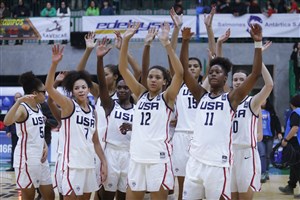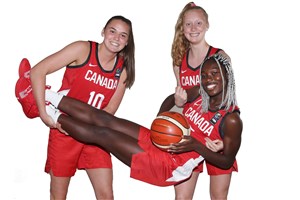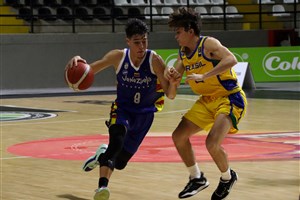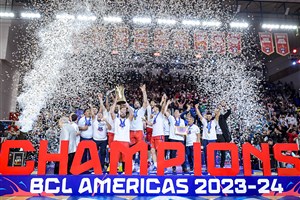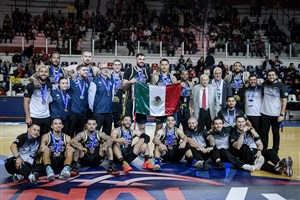
All of Argentina's eyes are set on its U19 National Team
BUENOS AIRES (Argentina) – The world event will be the conclusion of a great process for this generation — one of Argentina’s most promising in recent years. The group started to work together since they were in U15 and, even without official competitions, represented the South American nation in several international tournaments, including the FIBA U18 Americas Championship 2018, where they qualified to the World Cup after winning the third place.
The Argentine U19 national team will face a great test on their next international tournament, which will take place from June 29 to July 7 on the Greek island of Crete. The 2000 generation is worthy to have all eyes set on them. After the accomplishments by the historic Golden Generation, these young men are the future of the national team, and the Argentine Basketball Confederation (CABB, for its Spanish acronym) is working tirelessly with them. Because of this, and under Federico Susbielles’ presidency, the CABB decided to foster the best possible preparation to ensure the best performance of their players in the world stage.
“The idea was to train uninterruptedly before the tour and the tournament. We're satisfied with how they've prepared, and we hope to play friendlies that will allow us to get there in top shape. Whenever representing our country, it's expected that we show all our pride and that we boost our game. We feel that if we achieve control in each game, we’ll increase our chances. We must focus on the first day and, from there, grow in the tournament,” stated the team’s coach, Maximiliano Seigorman, to FIBA.basketball.
Juan De La Fuente, a gold medal in last year’s Youth Olympic Games in Buenos Aires, is one of the 12 players that will play in the U19 World Cup with the Argentine team coached by Seigorman. “We're hopeful, we're teammates above all. Our team is built on a strong sense of solidarity; there are no egos and that's really good. We always have high expectations. We know the rivals we're facing, and the advantage Greece will have as locals in our group. But we're confident, (although) we're logically nervous,” added the Mar del Plata native.
The Argentine national team trained at Buenos Aires’ CeNARD facilities until Tuesday, June 18, and then left for Serbia, where they’ll play three friendly games. There they’ll stay until the 26, when they’ll travel to Greece and wait for their debut on Saturday 29, against Russia. They’ll also join the Philippines and the hosts for Group C. After a regular three-game phase, all participants will move on to the round of sixteen where the direct elimination phase will begin.
El entrenador de la Selección mayor, @ssergioh, como en casi todas las concentraciones de equipos formativos, pasó por CeNARD para conversar un rato con la Selección u19. pic.twitter.com/SWb7uI73Pg
— CABB (@cabboficial) 13 de junio de 2019
“The group is really difficult, and the initial game is against Russia, who are coming in with a good roster that has developed a good game in the last European (Championships). Having two leaders and two point guards that move the team forward gives them stature and momentum. The Philipines is a quick team with swift players in the perimeter. Likewise, Greece, as locals, has a generation roster that didn't do very well in the last Euro, but they do have several players with more experience in the Greek league. Small forward Rogkavopoulos is the main scorer, but they also have players that are very significant to their game,” added the Argentine coach.
Argentina's process began on May 25 at the city of Bell Ville, in the region of Córdoba, where the national team worked for a week and then played a friendly game with a team from the South Eastern Association. Then they moved to Las Varillas, also in Córdoba, where Francisco Cáffaro joined the squad and two other games took place: against the Córdoba Association team and against the San Francisco Association.
The player's list includes four that play outside of the country's borders. Cáffaro plays in the University of Virginia, the most recent NCAA champions; and Francisco Farabello at Texas Christian University. Leandro Bolmaro and Juan Francisco Fernández, for their part, play in Spain. Bolmaro, at the prestigious FC Barcelona; and Fernández, the youngest of the whole roster, plays at Baloncesto Fuenlabrada.
“We're relaxed. We have a good team and we're training quite hard to get well to the tournament and give it all. We know that we can play a good tournament, but we must take it game by game. There are a lot of expectations and we're relaxed. Game by game, step by step, and that are how we can do it,” said small forward/shooting guard Leandro Bolmaro to FIBA.basketball, who added: “This isn’t an easy zone. There's Russia, one of the strongest; Greece, who are locals; and we can't underestimate the Philippines. We're going to give our all and everything for our jersey. We know that whatever happens, we did our best and that they had to show us that they could defeat us.”
Of the original 22 players convened, Tomás Chapero, Lucas Reyes and Marco Giordano were the last ones to join the team due to previous commitments. After cutting out Ramiro Ratter, Juan Hierrezuelo, Federico Pedano, Ulises Sangoy, Ramiro Ledesma and Máximo Milovich, the group traveled to Buenos Aires with 16 players. The final team includes eight players that were part of the team’s third place at the U18 FIBA Americas Championship in 2018.
After last Wednesday's friendly, Juan Cruz Marini, Julián Eydallín, Christian Bihurriet, and Thomas Notarainni were cut. The latter was born in the United States and plays for Cathedral Catholic High School. Notarainni, whose mother was born in Argentina, arrived thanks to CABB’s scouting both in and out of the country, which has allowed to bring several young players raised overseas to the selection process.
Like this, CABB is working toward growing and strengthening their youth national teams to get better results for the future of the senior team and so that reaching an international podium becomes, once again, one of the main objectives.
FIBA

